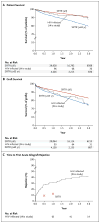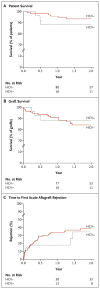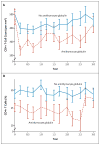Outcomes of kidney transplantation in HIV-infected recipients
- PMID: 21083386
- PMCID: PMC3028983
- DOI: 10.1056/NEJMoa1001197
Outcomes of kidney transplantation in HIV-infected recipients
Erratum in
- N Engl J Med. 2011 Mar 17;364(11):1082
Abstract
Background: The outcomes of kidney transplantation and immunosuppression in people infected with human immunodeficiency virus (HIV) are incompletely understood.
Methods: We undertook a prospective, nonrandomized trial of kidney transplantation in HIV-infected candidates who had CD4+ T-cell counts of at least 200 per cubic millimeter and undetectable plasma HIV type 1 (HIV-1) RNA levels while being treated with a stable antiretroviral regimen. Post-transplantation management was provided in accordance with study protocols that defined prophylaxis against opportunistic infection, indications for biopsy, and acceptable approaches to immunosuppression, management of rejection, and antiretroviral therapy.
Results: Between November 2003 and June 2009, a total of 150 patients underwent kidney transplantation; survivors were followed for a median period of 1.7 years. Patient survival rates (±SD) at 1 year and 3 years were 94.6±2.0% and 88.2±3.8%, respectively, and the corresponding mean graft-survival rates were 90.4% and 73.7%. In general, these rates fall somewhere between those reported in the national database for older kidney-transplant recipients (≥65 years) and those reported for all kidney-transplant recipients. A multivariate proportional-hazards analysis showed that the risk of graft loss was increased among patients treated for rejection (hazard ratio, 2.8; 95% confidence interval [CI], 1.2 to 6.6; P=0.02) and those receiving antithymocyte globulin induction therapy (hazard ratio, 2.5; 95% CI, 1.1 to 5.6; P=0.03); living-donor transplants were protective (hazard ratio, 0.2; 95% CI, 0.04 to 0.8; P=0.02). A higher-than-expected rejection rate was observed, with 1-year and 3-year estimates of 31% (95% CI, 24 to 40) and 41% (95% CI, 32 to 52), respectively. HIV infection remained well controlled, with stable CD4+ T-cell counts and few HIV-associated complications.
Conclusions: In this cohort of carefully selected HIV-infected patients, both patient- and graft-survival rates were high at 1 and 3 years, with no increases in complications associated with HIV infection. The unexpectedly high rejection rates are of serious concern and indicate the need for better immunotherapy. (Funded by the National Institute of Allergy and Infectious Diseases; ClinicalTrials.gov number, NCT00074386.).
Figures



Comment in
-
Tackling the unknowns in HIV-related kidney diseases.N Engl J Med. 2010 Nov 18;363(21):2058-9. doi: 10.1056/NEJMe1010940. N Engl J Med. 2010. PMID: 21083392 No abstract available.
-
Outcomes of kidney transplantation in HIV-infected recipients.N Engl J Med. 2011 Feb 17;364(7):683; author reply 684. doi: 10.1056/NEJMc1014114. N Engl J Med. 2011. PMID: 21323551 No abstract available.
-
Outcomes of kidney transplantation in HIV-infected recipients.N Engl J Med. 2011 Feb 17;364(7):683; author reply 684. doi: 10.1056/NEJMc1014114. N Engl J Med. 2011. PMID: 21323552 No abstract available.
-
Transplantation: HIV infection is no barrier to kidney transplantation.Nat Rev Nephrol. 2011 Feb;7(2):63. doi: 10.1038/nrneph.2010.182. Nat Rev Nephrol. 2011. PMID: 21355121 No abstract available.
-
Kidney transplantation in HIV-infected patients.Am J Kidney Dis. 2011 Jul;58(1):10-2. doi: 10.1053/j.ajkd.2011.03.012. Epub 2011 Apr 29. Am J Kidney Dis. 2011. PMID: 21530034 No abstract available.
References
-
- Rao TK, Filippone EJ, Nicastri AD, et al. Associated focal and segmental glomerulosclerosis in the acquired immunodeficiency syndrome. N Engl J Med. 1984;310:669–73. - PubMed
-
- Pardo V, Aldana M, Colton RM, et al. Glomerular lesions in the acquired immunodeficiency syndrome. Ann Intern Med. 1984;101:429–34. - PubMed
-
- Ross MJ, Klotman PE. Recent progress in HIV-associated nephropathy. J Am Soc Nephrol. 2002;13:2997–3004. - PubMed
-
- Choi AI, Rodriguez RA, Bacchetti P, et al. Low rates of antiretroviral therapy among HIV-infected patients with chronic kidney disease. Clin Infect Dis. 2007;45:1633–9. - PubMed
-
- Fine DM, Perazella MA, Lucas GM, Atta MG. Renal disease in patients with HIV infection: epidemiology, pathogenesis and management. Drugs. 2008;68:963–80. - PubMed
Publication types
MeSH terms
Substances
Associated data
Grants and funding
LinkOut - more resources
Full Text Sources
Other Literature Sources
Medical
Research Materials
